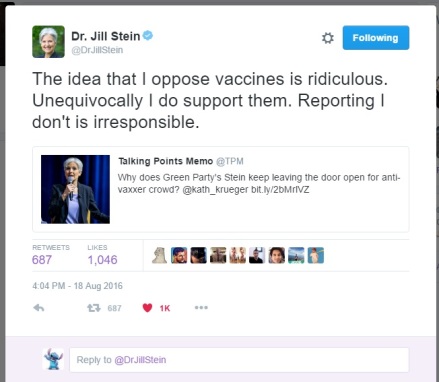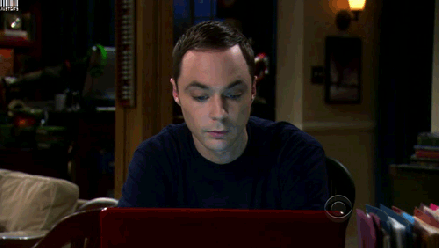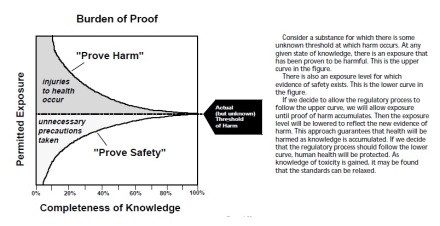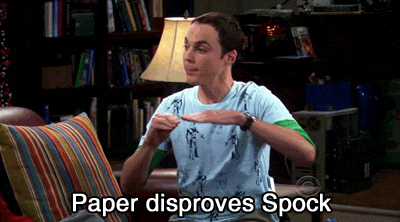The simple question I would like to explore here is this: Why do some people persist in painting Jill Stein as an anti-science candidate, despite so much evidence to the contrary? I will primarily address the content of this accusation here, along with the supporting evidence (or lack thereof) that has been given for some of the recent claims about Dr. Stein. I would not like to make this a post on why one should vote for Stein, because that’s each person’s decision to make (perhaps I will later on, in a separate post). Instead, it is my intention to help dissolve some of the most egregious rumors, so voters can focus on Dr. Stein’s intended political message.
(There are already some great articles that address the strategic use of these attacks quite well, check out: http://www.inquisitr.com/3432300/no-jill-stein-supporters-you-are-not-crazy/ & http://www.counterpunch.org/2016/08/19/roaming-charges-prime-time-green/)
Although recent articles and discussions on social media have relied upon many differing assumptions, evidence, or justifications, the essential charge is that Dr. Jill Stein promotes or gives cover to dangerous, anti-scientific ideas. Instead of responding to that oversimplified claim, it might be more useful to address each one individually. Here are some of the accusations I’ve heard repeated…
Rumor(s): ‘She’s an anti-vaxxer!’, or ‘has made statements that ‘dog-whistle’ to anti-vaxxers’.

Why it’s BS: Even though this particular claim has already been evaluated as FALSE by Snopes.com (http://www.snopes.com/is-green-party-candidate-jill-stein-anti-vaccine/), the rumor continues to be spread freely, so perhaps the Snopes article deserves further attention. As reported in the article, this rumor is often attributed to a comment Stein made during a Reddit AMA back in April of this year (see link above for transcript). However, none of Jill Stein’s statements have suggested that she denies the necessity of vaccines, but instead she has repeatedly affirmed the importance of immunization on multiple occasions.
The first reaction directly from Jill Stein that I watched was during an interview with The Young Turks (https://www.youtube.com/watch?v=jNG3gDTPYjc), in which Jordan Chariton asks, “Plain and simple, yes or no, do you think vaccines cause autism?” Stein responds with a sturdy, “No,” before explaining her position in further detail.

Recognizing this fact, other writers have tried to reframe the narrative to criticize her wording as being a ‘dog-whistle’ for anti-vaxxers (http://www.huffingtonpost.com/entry/jill-stein-may-not-be-anti-vax-but-shes-pushing-a-dangerous-anti-vax-theory_us_579f885ce4b0693164c1fab4), either because she doesn’t seem to explicitly refute anti-vaxx talking points, or perhaps because she expresses distrust towards government’s ability to provide unbiased oversight on this issue.
Then, during CNN’s Green Party town hall on August 17th, an audience member addressed Stein about the same rumor. The pediatrician asked, “…when I was reading your statements, you seem to support vaccines yet you’re evasive about your schedule, or your support of the schedule, so I just wanted you to clarify that for me.” (https://www.youtube.com/watch?v=QTpz2XBGce0).
Stein’s response should help ease any doubts about the clarity of her position:
“ …that statement about the schedule was taken out of context. So when I was practicing and following issues around immunization, which I am not now, there were concerns at the time about the mercury dose in vaccines and how kids might be loaded up in a way related to that schedule and the presence of thimerosal in the vaccines. That’s what I was referring to, that there were legitimate questions at that time. But I understand those — you know, the thimerosal has been taken out of the vaccines, anything that would be given to a child, and it’s no longer an issue.
I think there’s kind of an effort to divert the conversation from our actual agenda, because the idea that I oppose vaccines is completely ridiculous…or that I’m ‘anti-science’. And I would encourage anybody to go look up the books that I co-authored with other physicians and public health experts at Physicians For Social Responsibility. One is called “Environmental Threats to Healthy Aging”, “Toxic Threats to Child Development”, those are two books actually. They’re both available for free on the web. You can read them on the web or download it. They both review science and they review scientific studies to have a better understanding of what is the conditions that maybe driving the developmental disabilities, what may be contributing to these issues that we’re seeing and likewise what are some of the contributors to chronic disease in adults. There are clearly, you know, environmental factors here that are playing a role.
So just for policy wonks, for geeks, for science geeks, you can show yourself if you have any doubt that I, too, am a science geek. I am certainly not hostile to science. I’m not anti-science. I believe that asking questions is part of our responsibility as scientists and as physicians. We always need to be asking those questions.”
Many of us (like myself) who generally detest anti-vaxxer rhetoric are likely hyper-sensitive when it comes to anything that resembles one of their talking points. But remember who we’re dealing with here- a Harvard-educated MD who co-authored a report published in the peer-reviewed Journal of Developmental & Behavioral Pediatrics, on the impact of environmental contaminants on childhood development. This research was published in collaboration with other medical professionals and the organization called ‘Physicians for Social Responsibility’. Any disapproval of the former levels of mercury (thimerosal) used in vaccines she alluded to, comes from this extensive research on neurotoxicology & childhood development, rather than a desire to scare people away from vaccines. Otherwise, she wouldn’t have said, “it’s no longer an issue”!
As a skeptic who dislikes pseudo-science and science-deniers in general, I would argue that it is us (science enthusiasts) who have inferred these supposed ‘dog-whistles’, instead of it being Dr. Stein who has conveyed them intentionally. How many have really taken the effort to read her published works, or to understand her statements in their intended context?
It seems that those perpetuating this particular narrative either ignore Dr. Stein’s statements/responses entirely or they conflate her message criticizing corporate influence on government regulation with similar arguments made by actual anti-vaxxers to support their own ideas. Here it stands that context is everything, and given Dr. Stein’s multiple responses to this rumor, one could conclude that much more effort has been spent making something out of nothing, than actually scrutinizing the claim by seeking out primary sources.
Rumor(s): ‘She thinks that Wi-Fi is dangerous.’

Why it’s BS: This particularly crazy-sounding rumor can be seen spread around in articles like this: http://www.sciencealert.com/us-presidential-candidate-jill-stein-thinks-wi-fi-is-a-threat-to-children-s-health. This claim appears to stem from a Q&A session video posted on YouTube (https://youtu.be/IGQjaSJP2Xg), where Dr. Stein, after answering a question concerning the amount of time kids spend in front of computer screens today, responds to an audience member asking, “What about Wi-Fi?” We can assume in its context as a follow-up that the questioner is referring to prolonged or excessive exposure. Here is Dr. Stein’s response:
“We should not be subjecting kids’ brains especially to that. And, you know, we don’t follow that issue in this country, but in Europe where they do, they have good precautions around wireless, maybe not good enough, because it’s very hard to study this stuff. We make guinea pigs out of whole populations and then we discover how many die. And this is like the paradigm for how public health works in this country and it’s outrageous, you know.”
Although this answer didn’t inspire me with much confidence, government organizations such as NIOSH, OSHA and the FCC have continued to study the effects of wireless/EMF frequencies on human health. In a 2011 Tech Symposium, one report discussed the Europe vs. US differences which Dr. Stein mentioned. This report backed up the first portion of her comment as it concluded, “…the difference between the camps [Europe & the U.S.] is the higher tolerability to risk (RF interference and human hazards) of the North American approach compared to the European approach.” (Mazar, 2011). Personally, I generally tend to wait for the evidence of harm before coming to any conclusions myself, however, I can easily understand the propensity for others to take a different perspective. It’s not easy to be confident about safety or risk in this scenario because the research to date has either been inconsistent, or inconclusive. Dr. Stein’s answer might suggest she thinks it [exposure] may be harmful, but her response makes sense when you consider her broader philosophy concerning public health…
Below is an excerpt from her publication “In Harm’s Way” which helps to clarify that perspective. Basically, as we continue to study these issues, the public will remain “guinea pigs” as long as we regulate along the top curve of this diagram. Thus, what would follow from Dr. Stein’s statement, is that it might be preferable to take “unnecessary precautions” while evidence for safety accumulates- at least until it appears conclusive one way or the other.

Even if her answer above still seems inadequate to you, remember that Dr. Stein has not proposed any policy on this subject. She simply gave an off-the-cuff answer at a Q&A session- quite possibly because she is either not currently following the research on this, or she hadn’t anticipated the need to carve out a position on such an issue until that very moment. This image from her report in the Journal of Developmental and Behavioral Pediatrics provides a much better explanation of her philosophy towards public health.
Rather than being a proponent of ‘woo’, it seems that Dr. Stein would simply rather approach public health issues with a higher degree of caution and skepticism than many others. While we [skeptics] may balk at that idea, let’s not forget that she hasn’t suggested we move away from any of these things (e.g. vaccines, Wi-Fi, etc.). Instead, she is a proponent of the idea that we should spend more time studying the things we interact with in our environments. The assumption that by advocating for more research, she secretly intends to promote a pseudo-scientific agenda, is just not supported by her academic and professional history. Failing to consider these nuances might just be part of the common knee-jerk reaction which so many people have against anything that even “feels like woo”.

I wanted to share these links and information so that people had access to more useful primary sources, instead of opinions alone. Access to these materials will help those who wish to critically evaluate future claims which propagate a false narrative about Dr. Stein, and I urge others to read her reports that can be found for free online before passing judgment:
- “In Harm’s Way: Toxic Threats to Child Development”
http://www.psr.org/chapters/boston/resources/in-harms-way.html?referrer=https://www.google.com/
- “Environmental Threats to Healthy Aging”
http://www.agehealthy.org/pdf/GBPSRSEHN_HealthyAging1017.pdf
Please let me know if you would like to share any more resources that might help people better understand Dr. Stein, or to clarify her message. Thanks!
-M


You must be logged in to post a comment.